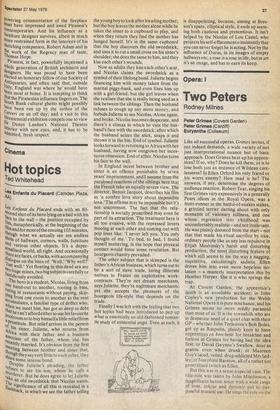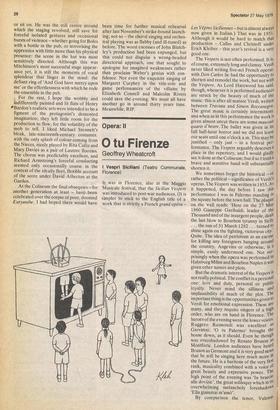Opera: I
Two Peters
Rodney Milnes
Peter Grimes (Covent Garden) Peter Grimes (Cardiff) Euryanthe (Coliseum)
Like all successful operas, Grimes invites, if not indeed demands, a wide variety of not just interpretational nuance but of basic approach. Does Grimes beat up his apprentices? If so, why? Does he kill them, or is to lose both just an instance of Wildean carelessness? Is Ellen Orford his only friend or his worst enemy? How mad is he? The answers, if any, determine the degrees of audience reaction. Robert Tear, singing his first Grimes very expressively in a generally Pears idiom at the Royal Opera, was a front-runner in the hatful-of-snakes stakes, a grizzled terrier darting about with only moments of visionary stillness, and one whose regression into childhood was uncomfortably realistic — and not irrelevant. He was plainly doomed from the start — not that that made his ritual sacrifice by nice, ordinary people like us any less repulsive in Elijah Moshinsky's harsh and disturbing production, the most disturbing feature of which still seems to me the way a nagging, inquisitive, calculatingly sadistic Ellen drives him into even more hopeless isolation — a masterly interpretation this by Heather Harper. She it is who springs the trap.
At Covent Garden, the apprentice's death is an avoidable accident; in John Copley's new production for the Welsh National Opera it is pure mischance, and his Grimes seems no more mildly paranoid than most of us. It is the townsfolk who are in dcsparate need of a quiet chat with their GP — whether John Treleaven's Bob Boles, got up as Rasputin, plainly keen to have apprentices en brochette for breakfast and furious at Grimes for having had the idea first; or David Gwynnc's Swallow, dour as granite even when drunk; or Maureen Guy's laced, veiled. drug-addicted Mrs Scdley; orlosephine Barstow, all of a rather too generalised twitch as Ellen, But this was in a sense a 'special case. The title-role was taken by John Mitchinson, a inagnificent heroic tenor with a wide range of tone, colour and dynamic put to purposeful musical use. He sings the role on the or sit on. He was the still centre around which the staging revolved, still save fo'r forceful isolated gestures and occasional bursts of violence — whether going for Boles with a bottle in the pub, or terrorising the apprentice with little more than his physical presence: the scene in the hut was most sensitively directed. Although this was Mitchinson's most successful stage appearance yet, it is still the moments of vocal splendour that linger in the mind: the defiant ring of 'And God have mercy upon me' or the effortlessness with which he rode the ensemble in the pub.
For the rest, I hope the wobbly and indifferently painted and lit flats of Henry • Bardon's realistic sets were intended to be a figment of the protagonist's demented imagination; they left little room for the production to flow, for the volatility of the mob to tell. I liked Michael Stennett's bleak, late-nineteenth-century costumes. with the only splash of colour coming from the Nieces, nicely played by Rita Cullis and Mary. Davies as a pair of Lautrec floozies. The chorus was predictably excellent, and Richard Armstrong's forceful conducting seemed only occasionally coarse in the context of the ideally fleet, flexible account of the score under David Atherton at the Garden.
At the Coliseum the final obsequies — for another generation at least — have been celebrated over the corpse of poor, doomed Euryanthe. I had hoped there would have
been time for further musical rehearsal after last November's strike-bound launching; not so — the choral singing and orchestral playing was as flabby (and ill-tuned) as before. The worst excesses of John Blatchley's production had been expunged, but this could not disguise a wrong-headed directorial approach, one that sought to apologise for imagined weaknesses rather than proclaim Weber's genius with confidence. Not even the exquisite singing of Margaret Curphey in the title-role and game performances of the villains by Elizabeth Connell and Malcolm Rivers could save the evening. We must all have another go in around thirty years time. Meanwhile, RIP.



































 Previous page
Previous page